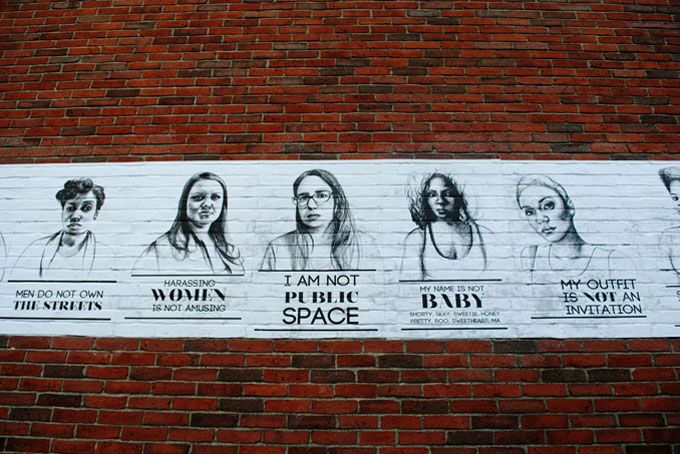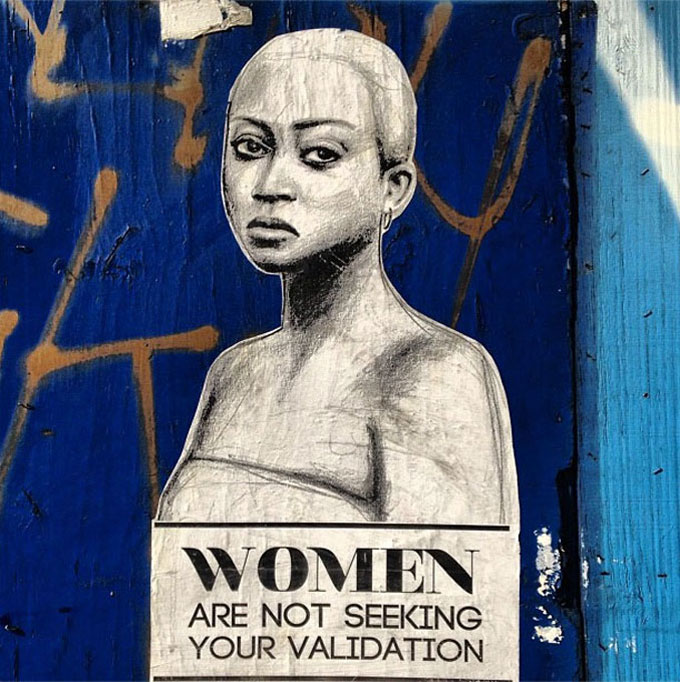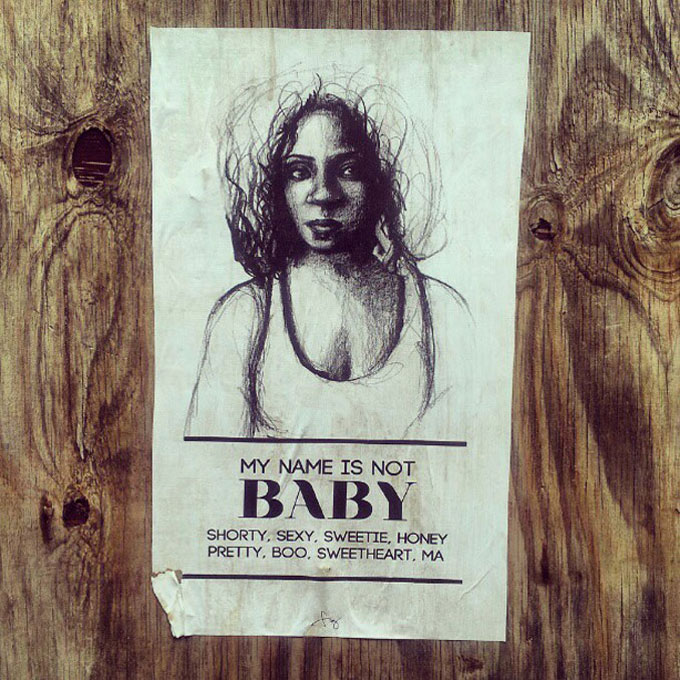
Tatyana Fazlalizadeh, “Stop Telling Women to Smile.”
A woman is waiting at the bus stop after just receiving some bad news. A man tells her to smile because she’s “too pretty not to.”
A man walks close to a woman on the street to whisper to her, “I like those legs.”
As I walk to the train station, a man says in my ear, “Be careful how you dress. There’s a rapist out here.”
These stories are only a few picked out of a pool of experiences that make up a woman’s everyday life. I could tell you a few things that men have said to me on the street that made me feel dirty, unsafe, and like a piece of meat. But my experience with sexism and harassment does not just exist in a few anecdotes—it is interwoven in my entire reality as a person. Just like most women. This is what lead me to create my street art series Stop Telling Women to Smile—not just one particularly bad experience, but the threat of street harassment, from microaggressions to physical assault, that I face everyday.
Even though these incidents happen in public, they still feel like private, vulnerable moments. By bringing these experiences into the light, I’m trying to change the way we think about this problem—not as a private issue that falls to the woman to solve, but a public one for which we all share responsibility.
When talking about street harassment women tend to get the same responses again and again. “Take it as a compliment,” a man might say, but what he really means is “Take your abuse with a smile.” When a man says “I don’t see the big deal,” he’s saying “Your experience is not important to me.” When a man says “That isn’t actually harassment,” they are taking away a woman’s authority over her own story. When a man says “That’s just how men are,” they are ridding men of any responsibility.

Tatyana Fazlalizadeh, “Stop Telling Women to Smile.”
Public awareness of street harassment seems to be growing, especially online, and the Twitter hashtags #YesAllWomen and #YouOKSis have sprung up as places for women to share stories and offer support. As more women are voicing their experiences, men need to learn how to respond—because right now, responses often shift the conversation right back to a dynamic that normalizes catcalling and silences women.
Even well intentioned men participate in dialogue that centers their own interests and perpetuates male dominance. When I tell men about my project, they often ask “Well, how should I approach a woman I find attractive in the street?” glossing over women’s experiences and jumping to the conversation that benefits them. When this happens I sometimes wonder if men understand what I’m talking about, if they know what it feels like to have someone hiss at you like a dog or grope you on the train. But they do not. Male privilege affords them the freedom not to. The reality of moving through public space is drastically different for men and women.
Instead of trying to speak with authority about an oppression they have not experienced, men should participate in the public discourse on street harassment by figuring out just how they are complicit in a society that allows this to happen, and what they can do to help stop it. That begins by listening to women when they talk about what they go through, and believing them.
It’s arrogant to tell a marginalized person that what they experience is not real or valid. Yet a man will often attempt to dominate a conversation about a woman’s experience in order to uplift his own opinions or interests. Don’t. Have a seat.

Tatyana Fazlalizadeh, “Stop Telling Women to Smile.”
Even receiving the exaggerated amount of abuse that black women receive, I, too, have to take a seat when others tell their stories. I am cis and able-bodied. I’m not subject to the same threat of violence as trans women, or the specific abuse young women, or fat women, or Native women, or women with disabilities receive. In talking with them, I have a seat, I listen to them and believe them. When someone you have privilege over tells how their identity leads others to abuse them, don’t get defensive, try searching for empathy, and how you might be contributing to that abuse yourself.
Maybe you have never catcalled a woman on the street. But maybe you have witnessed it and not intervened. Maybe you have excused the behavior by saying “Men are just like that,” perpetuating the idea that manhood is defined by sexual aggression. Listen to women when they tell you about the times they were insulted by a man as punishment for not receiving his advances, and ask yourself if you’ve ever used the same language to or about a woman.
If so, check yourself. Check your friend when he uses language that is violent towards women. Step up when a man on the train hassles a woman. Interrupt your coworker who’s going in for a rape joke. When you see an attractive woman on the street who maybe you would like to take on a date, remember that she might be exhausted and triggered by a slew of leers and catcalls and rethink approaching her to lay your sexual desires onto her.
Not being the jerk who yells at women, or the creep who whistles at them, does not exclude you from the problem. You have a responsibility. Listen to women, trust their realities, find your role, and help shift society to place to a place where it is not acceptable for men to be violent towards women.
This piece, commissioned by Creative Time Reports, has also been published in Salon.

